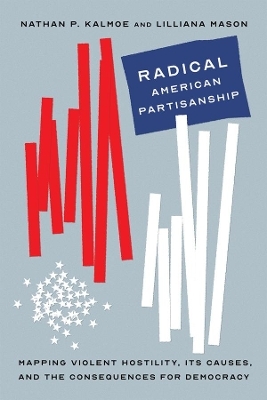
Radical American Partisanship
University of Chicago Press (Verlag)
978-0-226-82028-6 (ISBN)
Political violence is rising in the United States, with Republicans and Democrats divided along racial and ethnic lines that spurred massive bloodshed and democratic collapse earlier in the nation's history. The January 6, 2021 insurrection and the partisan responses that ensued are a vivid illustration of how deep these currents run. How did American politics become so divided that we cannot agree on how to categorize an attack on our own Capitol?
For over four years, through a series of surveys and experiments, Nathan P. Kalmoe and Lilliana Mason have been studying radicalism among ordinary American partisans. In this groundbreaking book, they draw on new evidence-as well as insights from history, psychology, and political science-to put our present partisan fractiousness in context and to explain broad patterns of political and social change. Early chapters reveal the scope of the problem, who radical partisans are, and trends over time, while later chapters identify the conditions that partisans say justify violence and test how elections, political violence, and messages from leaders enflame or pacify radical views. Kalmoe and Mason find that ordinary partisanship is far more dangerous than pundits and scholars have recognized. However, these findings are not a forecast of inevitable doom; the current climate also brings opportunities to confront democratic threats head-on and to create a more inclusive politics. Timely and thought-provoking, Radical American Partisanship is vital reading for understanding our current political landscape.
Nathan P. Kalmoe is associate professor of political communication in Louisiana State University's Manship School of Mass Communication and Department of Political Science. He is the author of With Ballots & Bullets: Partisanship & Violence in the American Civil War and coauthor of Neither Liberal nor Conservative: Ideological Innocence in the Mass Public. Lilliana Mason is associate research professor of political science at Johns Hopkins University's SNF Agora Institute and Department of Political Science. She is author of Uncivil Agreement: How Politics Became Our Identity.
Chapter 1. Recognizing Partisan Extremes
Chapter 2. Radical Historical Roots
Chapter 3. Radical Partisan Psychology
Part I. Identifying Radical Partisans
Chapter 4. The Scope of Radicalism
Chapter 5. Trends: Stumbling toward a Breakdown
Chapter 6. Who Are the Radical Partisans?
Part II. Radical Behaviors and the Impact of Conditions and Events
Chapter 7. From Radical Views to Aggressive Behavior
Chapter 8. Historical Precedents and Reasons for Violence
Chapter 9. Reactions to Election Losses and Violent Events
Part III. Communicating Radicalism
Chapter 10. Words Matter
Chapter 11. The Future of Radical Partisanship: Risks and Opportunities
Acknowledgments
Notes
References
Index
| Erscheinungsdatum | 11.04.2022 |
|---|---|
| Reihe/Serie | Chicago Studies in American Politics |
| Zusatzinfo | 45 line drawings, 7 tables |
| Sprache | englisch |
| Maße | 152 x 229 mm |
| Themenwelt | Sozialwissenschaften ► Politik / Verwaltung ► Politische Systeme |
| Sozialwissenschaften ► Politik / Verwaltung ► Politische Theorie | |
| ISBN-10 | 0-226-82028-9 / 0226820289 |
| ISBN-13 | 978-0-226-82028-6 / 9780226820286 |
| Zustand | Neuware |
| Haben Sie eine Frage zum Produkt? |
aus dem Bereich



